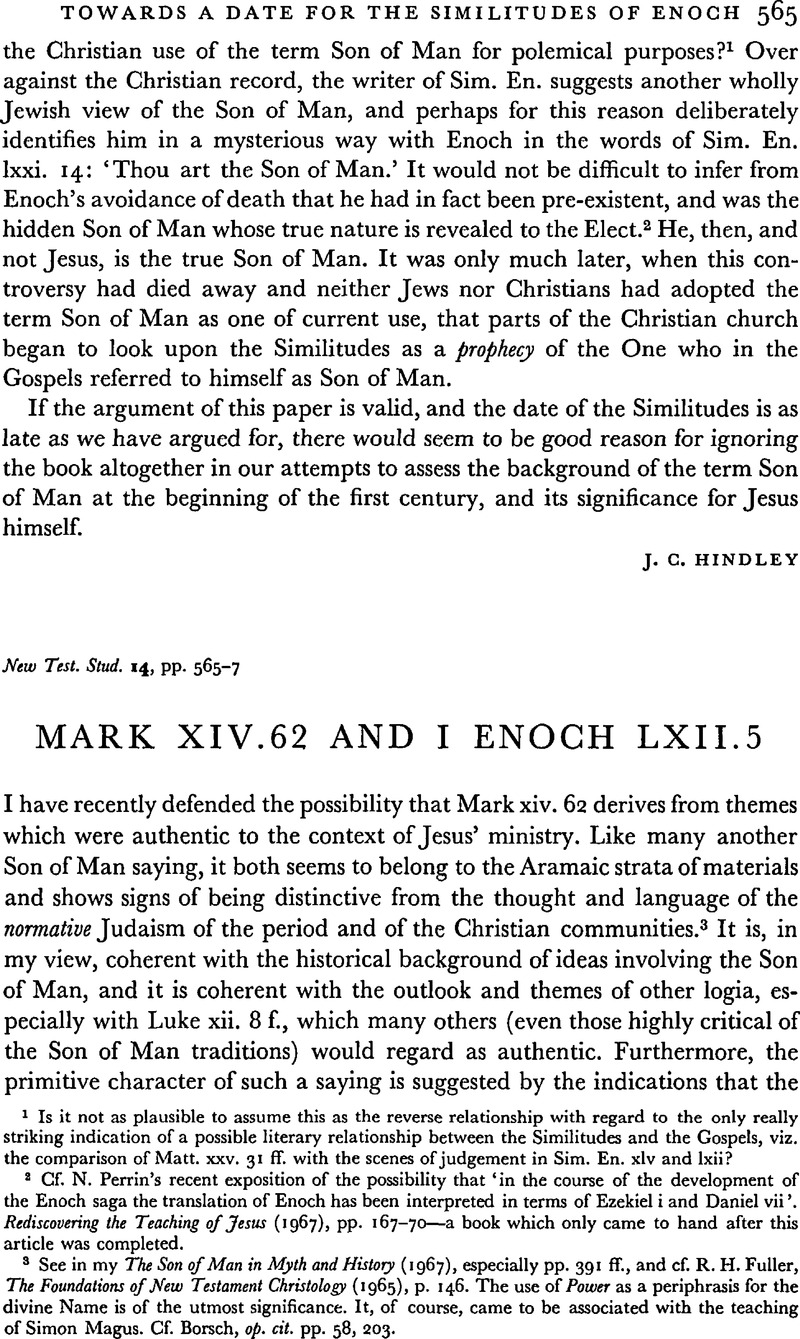No CrossRef data available.
Article contents
Mark xiv. 62 and I Enoch lxii. 5
Published online by Cambridge University Press: 05 February 2009
Abstract

- Type
- Short Studies
- Information
- Copyright
- Copyright © Cambridge University Press 1968
References
page 565 note 3 See in my The Son of Man in Myth and History (1967), especially pp. 391 ff., and cf Fuller, R. H., The Foundations of New Testament Christology (1965), p. 146.Google Scholar The use of Power as a periphrasis for the divine Name is of the utmost significance. It, of course, came to be associated with the teaching of Simon Magus. Cf. Borsch, op. cit. pp. 58, 203.
page 566 note 1 Perrin, N., ‘Mark xiv. 62: The End Product of a Christian Pesher Tradition?’, N.T.S. XII (1965/6), 150 ff.; Rediscovering the Teaching of Jesus (1967), pp. 173 ff.Google Scholar
page 566 note 2 It is my opinion that Acts vii. 55 f. is largely a Lucan formation which he has modelled on Jesus' statement before the Sanhedrin, thus adding a further parallel to the stories of their ‘martyrdoms’. Cf. Borsch, op. cit. pp. 233 ff.
page 566 note 3 Lindars, B., New Testament Apologetic (1961), pp. 122 ff.Google Scholar
page 566 note 4 E.g. (including expressions like ‘your eyes shall see’ and ‘all flesh shall see’) Exod. xvi. 7; Ps. xl. 3; Isa. xxxiii. 17; xxxv. 20; xl. 5; Ixvi. 14, 18; Ezek. xxxix. 21; Joel ii. 28; Mal. i. 5; Matt. v. 8; xxviii. 10; Mark xvi. 7; Luke iii. 6; John i. 50; xvi. 16, 17, 19; Acts ii. 17; I John iii. 2; Rev. xxii. 4. I have also maintained that John i. 51 and Matt. xvi. 28 may well reach back to themes authentic to the context of Jesus' ministry.
page 567 note 1 On this feature of sitting on God's throne, cf. I Enoch li. 3; Ixii. 2; and Borsch, op. cit. pp. 96, 104, 112, 150.
page 567 note 2 One must presume the Ethiopic word order to be a reasonable facsimile of the Greek and/or earlier Aramaic.
page 567 note 3 One must also consider the language of Matt. xix. 28 and xxv. 31 (the Son of Man ‘sitting on the throne of his glory’) which lies much closer to the Enochian phraseology than anything in Mark. Not only do these passages bear witness to a form of ‘tradition’ apart from what Mark has preserved, but the language in both Matthew and Enoch seems clearly dependent upon an Aramaic (or Hebrew) way of speaking.


